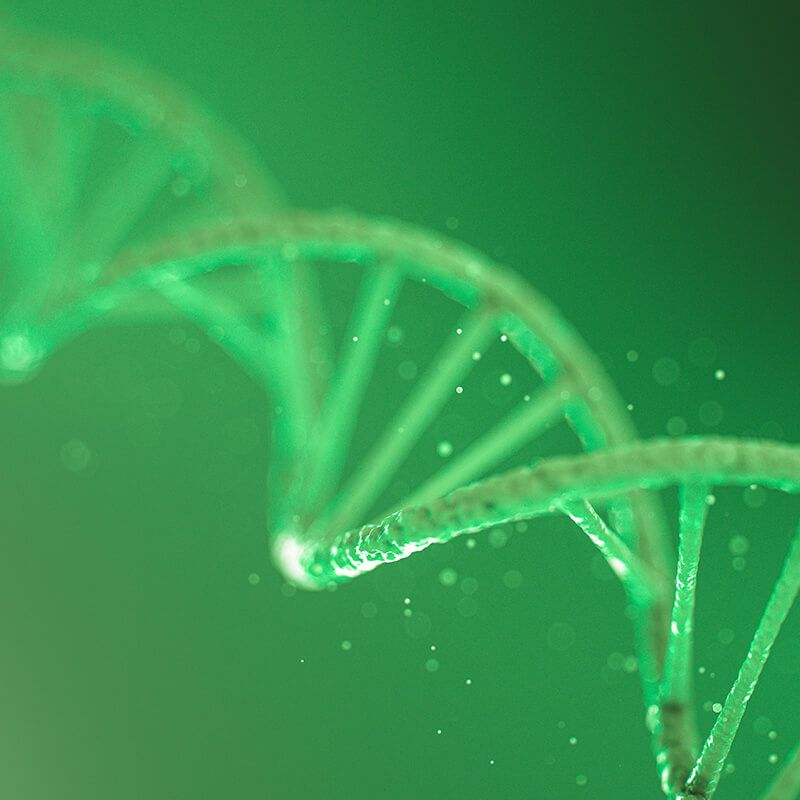
read time: 2 min
Health & Wellness
It’s not just your family tree. It’s also your family health.
When most people think of DNA testing, they usually imagine 1 of 2 things: online tools that help them discover their roots, or—thanks to TV crime dramas—a DNA test to pinpoint whodunnit. But DNA testing can actually play an even more important role in your life, and that’s to identify certain genetic code that could affect your health.
For instance, along with knowing your family's health history, DNA testing can help you determine if you’ve inherited any genetic variants that could increase your risk for certain diseases, such as cancer, diabetes, and heart problems.
But what’s a variant? Are genetics and genomics the same thing? Let’s start there.
How genetics comes into play
Genetics is the study of genes, which are functional groups of DNA passed down from your biological parents—1 set from each parent.1 Genomics is the study of all a person’s genes as a whole. Genes carry the instructions to determine whether you have blond or brown hair, have green or blue eyes, how tall you’ll grow, and a host of other traits. Genetics and genomics both have a hand in your health and the chance of developing certain diseases.1
So while you get your DNA and genetic traits from your parents, they get their DNA from their parents, who get it from their parents, and so on down the line. That said, it may come as a surprise to learn that 99.9% of our genetic makeup is identical to every other human being on the planet.1 The remaining 0.1% are called variants—they are what make us different1 and are incredibly important to understanding how genes can affect our individual health.
Genomics and its impact on your health

A closer look at genetic variants
Now let’s dive deeper into variants and what they mean for your health. DNA variants are what determine our inherited traits mentioned earlier—hair color, eye color, height, weight, etc.2 But variants, sometimes expressed as a bad line of code in our DNA sequence, can also cause health problems.3 That’s where DNA testing can help—by catching these genetic risks before they become problems.
How important is my biological family to my health?
Every human being shares DNA with their blood relatives, which is why your family’s health history is so important. In fact, it’s one of the biggest risk factors for disease.3 Within families, variants are often passed down from parent to child, and can continue being passed down from generation to generation. Meaning, if your dad had heart disease, you may have a higher chance of developing it, too.
Knowing your family’s health history, including what types of diseases your blood relatives had and at what age they were diagnosed, can help you better understand your own health risks. However, DNA tests can offer insights to your health even if you don’t know your family history. In fact, if you don’t have much information about your biological family’s medical history, DNA tests can help fill the gap about your health and any inherited risks.4
What will a DNA test tell me?
A DNA test will reveal whether or not you have certain variants in your genetic code that signal an increased risk for a specific health condition. DNA tests commonly screen for hereditary diseases, such as certain types of breast or colon cancers, along with heart conditions, blood disorders, or high cholesterol.1
Examples of genetic variants identified through DNA testing
Testing can also show that you may be a carrier of a health condition. Being a carrier means you may not have or develop the disease, but you can pass it on to your children.8
Even though some genes can increase your risk of serious conditions, these risks can be reduced through preventive measures.9 Understanding your genetic risks allows you to have an informed conversation with your doctor about any actions you should take.
Are genetic health tests readily available?
Yes, even advanced genetic health tests that use “next-generation sequencing” (NGS) DNA technology are in reach to help you learn more about identifying various inherited health risks. You can purchase a Genetic Insights test online from Quest without a doctor’s visit and receive a home collection kit. Included with your purchase, you have the option to discuss your results with an online genetic counselor.
What can’t a DNA test tell you?
Despite what a DNA test can reveal, it’s still an incomplete picture of your current health. Considerations, like lifestyle, diet, environmental pollutants,10 and other social factors can have a tremendous impact on your health, and DNA testing can’t always spell out those risks.
I have my results. Now what?
First, share the results with your doctor, who may suggest you talk with a genetic counselor. These certified healthcare professionals have the know-how to help you interpret the results in the context of your personal medical and family history. They can also help guide you in creating a plan of action, especially if the results show preventable risks.
If your results show no variants, congratulations. That means you’re unlikely to have inherited any risks for serious health conditions that were included in your test. But it doesn’t mean you’re off the hook entirely. Remember those lifestyle factors and other social determinants of health we mentioned? It’s still up to you to practice good health, mitigate your risks through diet, exercise, and other healthy practices. See your doctor on a regular basis, especially if you have a family history of disease.
A healthy path forward
So what now? While DNA testing can play an important role in your preventive care, it can’t predict your future health perfectly. It can, however, help you and your doctor know what to keep an eye on. Think of DNA testing as another tool that helps keep you informed and proactive about your health. The more you know, the better your chances of living a longer, healthier life.
References
1 Genetics vs. Genomics Fact Sheet.
National Human Genome Research Institute. Published September 7, 2018. Accessed December 2, 2022. https://www.genome.gov/about-genomics/fact-sheets/Genetics-vs-Genomics#:~:text=All%20human%20beings%20are%2099.9,about%20the%20causes%20of%20diseases
2 Lin B, Willemsen G, Abdellaoui A, Bartels, et al (2016). The Genetic Overlap Between Hair and Eye Color. Twin Research and Human Genetics, 19(6), 595-599. doi:10.1017/thg.2016.85
3 Institute of Medicine (US) Committee on Assessing Interactions Among Social, Behavioral, and Genetic Factors in Health; Hernandez LM, Blazer DG, editors. Genes, Behavior, and the Social Environment: Moving Beyond the Nature/Nurture Debate. Washington (DC): National Academies Press (US); 2006. 3, Genetics and Health. Accessed December 2, 2022. https://www.ncbi.nlm.nih.gov/books/NBK19932/
4 Genetic Testing.
Centers for Disease Control and Prevention. Office of Science (OS), Office of Genomics and Precision Public Health. Published June 24, 2022. Accessed December 2, 2022. https://www.cdc.gov/genomics/gtesting/genetic_testing.htm
5 BRCA Gene Mutations.
Division of Cancer Prevention and Control, Centers for Disease Control and Prevention. Published September 27, 2021. Accessed December 2, 2022. https://www.cdc.gov/cancer/breast/young_women/bringyourbrave/hereditary_breast_cancer/brca_gene_mutations.htm
6 Bhattacharya P, McHugh TW. Lynch Syndrome. [Updated 2022 Jul 18]. StatPearls [Internet]. Treasure Island (FL): StatPearls Publishing; 2022 Jan. https://www.ncbi.nlm.nih.gov/books/NBK431096
7 Centers for Disease Control and Prevention.
Other Related Conditions-Cardiomyopathy. Reviewed December 9, 2019. Accessed January 12, 2023. https://www.cdc.gov/heartdisease/cardiomyopathy.htm
8 Genetic Carrier Screening.
Johns Hopkins Medicine. Accessed December 2, 2022. https://www.hopkinsmedicine.org/gynecology_obstetrics/specialty_areas/fertility-center/infertility-services/genetic-screening.htm
9 Marteau TM, Lerman C. Genetic risk and behavioural change. BMJ. 2001 Apr 28;322(7293):1056-9. doi: 10.1136/bmj.322.7293.1056
10 Prüss-Ustün A, Wolf J, Corvalán C, et al. Preventing Disease Through Healthy Environments: A Global Assessment of the Burden of Disease from Environmental Risks. World Health Organization. Published 2016. Accessed December 2, 2022. https://www.who.int/publications/i/item/9789241565196










